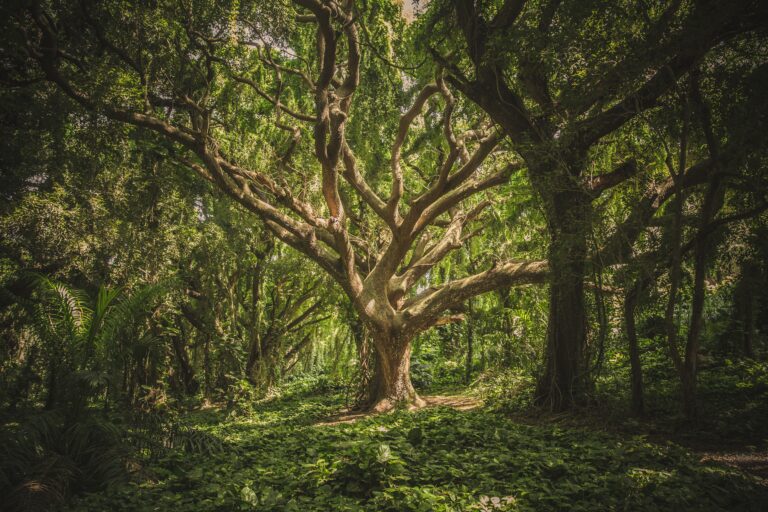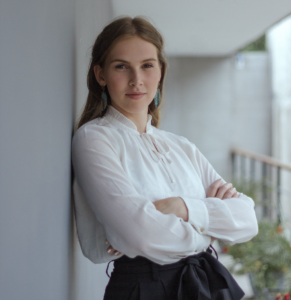Many times, people use the word “Nature” to refer to a place where they can feel peace, relaxation, and connection to their inner selves, away from busy city life. I believe there is much more to it. A week ago, I was walking through a forest with trees in all autumn colors you can imagine. I heard the dry leaves crunch below my feet and the birds chirp. My brisk walking pace slowed down and for just a moment, I stopped, closed my eyes, and listened to the melodies of the wind passing through the crowns of trees. I started yawning, not from boredom but from a deep feeling of security, sanctuary, and relaxation.
Suddenly, I became aware of the weight of my feet on the uneven surface below. I felt the wind caress my cheek, just slightly. Just like that, I felt connected to the life around me of which I am an intrinsic part. I could see my relationship with the Earth in my mind, like thousands of invisible glowing threads connecting me with every bush, tree, human, water droplet from the morning rain, bird, and squirrel around. Then, a humble reminder filled my being: I am Nature, too. It is the quintessence of me.
Five years ago, I made an alarming observation that completely changed my game plan. In many countries and cultures, ecosystems and non-human living beings are seen as human-owned objects whose reason for existence is to be exploited and used for human benefit and economic profit. This is a dominant narrative and permeates almost all spaces in which economic power is fostered and decision-making occurs. A pillar within this narrative is how “Nature” is often spoken about, through an insidious lens of a dichotomy that separates the human from ”Nature” and, arrogantly enough, states that humans are somehow superior. This is concerning because by maintaining this dichotomy in governance systems defined by anthropocentric violence against other life on Earth, humanity is contributing to irreversible collapse of ecosystems across the planet.
Am I more non-human than human?
For me, Nature is a process I am intrinsically part of. It is the web of life composed of interactive and reciprocal relationships that connect every organism on Earth into one planetary and complex interdependent ecosystem. Nature is not an object nor a series of objects, but a process of crisscrossing interconnected relationships.
I believe we must understand that we are Nature too. Nature lives within us and around us because we as humans are Nature too. At this moment, I carry 1,5 kg of “non-human” Nature in me. Without it, I die. Meanwhile, a study from 2018 argues that human cells make up only 43 percent of the body’s total cell count and that the rest are microscopic creatures. If this is true, would it mean I am more microbe than “human”?
What is my point with all of this? Well, I cannot separate myself from the water I drink, the food I eat, or the air I breathe. So, how do I best understand this intrinsic connection? Through stories.
Words configure reality
I am a storyteller, something we as humans always have been. As a storyteller, I must learn the power of my story, what value I place in the words I use, and how those words configure my understanding of reality. I have to begin asking myself what it means to be ”human” on a living planet with a complex web of diverse life. I have to begin asking myself what ”Nature” is. I have to begin asking myself how my words make up the stories that I construct about the world and myself as a member of a large community. Words have power because the way we use words produces and reproduces patterns, values, and perceptions. How do these stories shape the view we have of who we are and our relationship with the world around us? How do we create powerful stories of a new paradigm, and have those stories navigate us through ecological crises? Dare to confront assumptions.
Dissect Assumptions
I, like many others, constantly confront assumptions of the old paradigm, where “Nature” is seen as a rights-less object to exploit. Understanding the origin of those assumptions and being able to dissect them in our mind is essential in order to build a new sense of identity and relationship. By re-discovering word and story, we are re-discovering identity and relationship. In this case, relationship with the rest of the Earth. As we re-discover, we begin to understand the world around us in new ways.
One of my greatest life lessons so far is this: By constantly re-discovering my story and understanding the meaning I place in the words that construct that story, I can better understand today’s ecological reality and effectively implement actions needed to transform the norms that shape today’s decision-making around biodiversity, climate breakdown, and more. So, dear reader, I invite you to start taking action by asking yourself: What is my story? What is my message? How can I use my story to convey my message and build a deep relationship within the web of life?
Earth Advocacy Youth:
Earth Advocacy Youth is an international action group of young professionals in Earth Jurisprudence, amplifying young voices while identifying and implementing bold ecocentric practices in policy efforts addressing topics such as biodiversity, climate governance, and transition.


